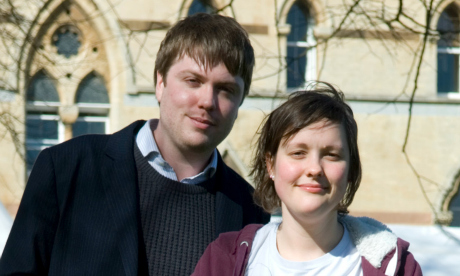Meet the man asking Hackney to ‘donate privilege’

Neil Griffiths with Arts Emergency co-founder Josie Long. Photograph: Graham Harrison
In a small office overlooking Gillett Square, Neil Griffiths is putting together ‘an alternative old boys’ network’. His charity Arts Emergency has so far put 100 students through its free mentoring scheme, giving them advice and work experience from local professionals who “donate privilege” to stop the arts from stagnating.
Griffiths, 35, started the charity after the government let universities charge up to £9,000 a year in fees, a move preventing many students from pursuing arts education for fear of a lifetime of debt.
Before founding Arts Emergency Neil Griffiths was an award-winning fundraiser for mainstream charities. But around five years ago he grew frustrated with the pace at which large charities worked, and hankered after doing something small and effective.
He was sitting in the bath, reading Kurt Vonnegut and smoking, he says, when the idea came to him: “I was reading Slapstick by Kurt Vonnegut which is all about a post apocalyptic society where social fabric has disintegrated entirely.
“In the book the president assigns people new families based, arbitrarily, on middle names. I thought, ‘I’m going to do that. Exactly that.’”
Griffiths began to develop ideas with his friend Josie Long, a comedian who was living in Hackney. The charity’s first meeting took place in one of Michael Gove’s flagship academies in the borough.
He invited a bunch of arts professionals and pinned up a picture of the Bullingdon Club on the wall. The 50 or so people in attendance spent the next couple of hours listing Old Etonians and how they had got ahead in a world where connections count.
Student boom
But the project stalled in 2011 when Griffiths’s brother died. He took four months of bereavement leave and decided to leave his job.
He recalls: “Arts Emergency was kind of what got me back to it. There was huge potential there and it was so positive. None of it was coming from ‘lamenting Thatcherism’ negative space. It was all coming from, ‘we’re all young empowered and educated and we just don’t like what’s going on so let’s do something about it’.”
Griffiths launched the first mentoring programme in 2012. Back then there were only 20 students but this year it will help 99. Since the last election, donors have jumped from 169 to 400, volunteers now exceed 2,700, and a new volunteer signs up with them every day.
Griffiths seems amazed, rather than pleased, that he’s managed to recreate ‘cultural capital’ outside the Oxbridge bubble.
Arts Emergency was born in Hackney. Griffiths picked the office after seeing the community clean-up assemble there after the riots, and the poster from their Hackney Empire gig has pride of place on the wall.
“There were big social reasons for doing something in Hackney,” Griffiths explains. “Nothing seemed to bridge the divide between people in social housing and those coming into Hackney from elsewhere, the communities that are predominantly ‘media people’. I felt it just took something practical to bring those communities together.”
Discussions of privilege are still a thorny area, not least in Hackney. So how did Griffiths sell an idea that could so easily have been a call-out?
“Rather than point a finger we asked people to ‘donate’ their privilege,” he explains. “It’s not even making privilege a loaded term. If we’re doing something we like, somebody somewhere helped us along the way.
“We deliver this idea of ‘sharing your privilege’ and giving a leg up to someone who you don’t know but we can vouch for, who really needs it.”
Hackney’s challenge
When asked what the greatest challenge is to young people in Hackney who want to work in the arts, Griffiths replies: “At the moment they don’t think it’s possible and if they do think it is possible they don’t know how.
“They have no information in schools because there’s no money for schools. We’ve had 20 per cent or more cuts to the budget in state further education, we’ve had adult learning close at the Community College.”
The council, he says, has yet to approach the charity. “The borough is always meeting and talking about ‘how do we address the gap’ – but they don’t even know we exist.
“We’ve got 20,000 Twitter followers and three thousand volunteers. No one’s ever been in touch with us to ask what were doing how we’re doing it.”
Jules Pipe, over to you.
